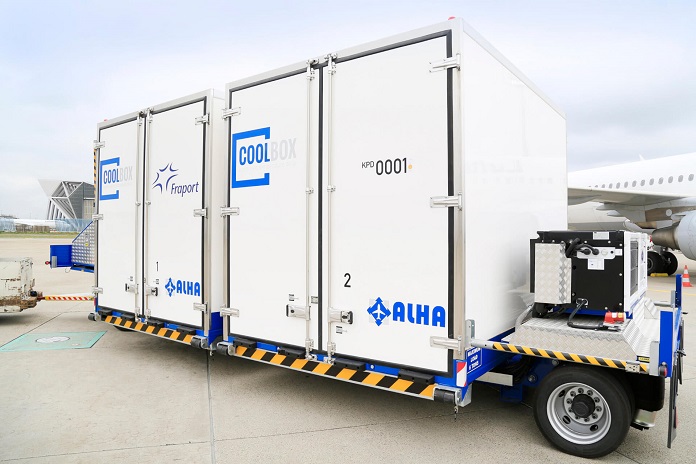
More Capacity of temperature-sensitive transportation of goods between – 20 °C and +30 °C – a fleet of 20 refrigerated transporters now available at Frankfurt Airport for pharmaceutical products – Fraport boasts a long track record of transporting temperature-controlled goods.
“The two new refrigerated transporters will give us maximum flexibility when it comes to handling temperature-sensitive goods. We have profound expertise in this area, and our customers benefit from this. It means that we can offer ideal infrastructure conditions together with our partners at Air Cargo Community in Frankfurt,” said Siegfried Pasler, head of ground handling services at Fraport AG. The new dollies are called “cool boxes.”
They allow pinpoint transportation of temperature-sensitive products in a range of between -20 and +30 °C. Each transporter has two cabins, which can be accessed efficiently from both sides. Each cabin is also fitted with an individually adjustable cooling system. Even when the engine is switched off and the outside temperature is 30 °C, the cabin will remain at the set temperature for over 60 minutes. The transporters also have an electronic temperature monitoring system and a tracking system, which enables them to continuously transmit up-to-the-minute loading information.
“Last year, we handled 120,000 metric tonnes of pharmaceutical products at Frankfurt Airport, making us Europe’s leading pharmaceutical hub. The expansion of the fleet significantly underpins our status even further, particularly with a view to the upcoming transportation of the coronavirus vaccine,” explained Max Philipp Conrady, head of cargo infrastructure and development at Fraport.
Fraport has been using state-of-the-art, high-performance temperature-controlled transporters for over twenty years now, giving the airport operator a long track record in this area. Frankfurt Airport currently has around 12,000 square meters of temperature-controlled handling capacity available for pharmaceutical products. Another 2,000 square meters are about to be put into operation. Over 75 percent of the airport’s transport routes are certified in accordance with international and European CEIV1 standards.










